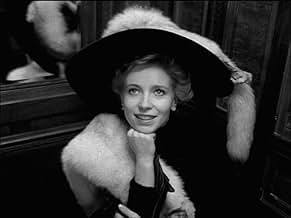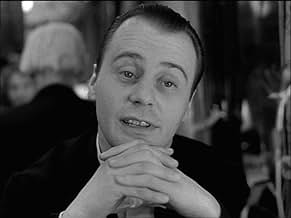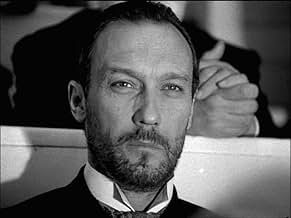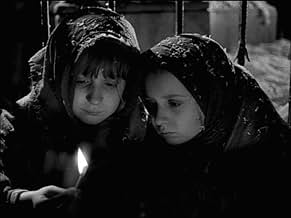VALUTAZIONE IMDb
7,0/10
2138
LA TUA VALUTAZIONE
Due sorelle gemelle, che sono cresciute separatamente, Dora una pseudo aristocratica e Lily una bombardiere anarchica, si ricongiungono attraverso Z, un misterioso viaggiatore dell'Orient-Ex... Leggi tuttoDue sorelle gemelle, che sono cresciute separatamente, Dora una pseudo aristocratica e Lily una bombardiere anarchica, si ricongiungono attraverso Z, un misterioso viaggiatore dell'Orient-Express.Due sorelle gemelle, che sono cresciute separatamente, Dora una pseudo aristocratica e Lily una bombardiere anarchica, si ricongiungono attraverso Z, un misterioso viaggiatore dell'Orient-Express.
- Regia
- Sceneggiatura
- Star
- Premi
- 1 vittoria in totale
Recensioni in evidenza
electricity...the stars talking...a dog with electrodes on its head...a whore and a terrorist...the pigeons...the donkey...siberia...what the freakin hell? this one either went right over my head. nothing else to say about this one but i'm supposed to fill up 4 lines. rating -6/10.
Hungarian female director Ildikó Enyedi's ON BODY AND SOUL (2017), her first feature in 18 years, is the recipient of 2017 Golden Berlin Bear, so it is high time to reappraise her under-seen body of work, here comes her dazzling Black-and-White feature debut MY TWENTIETH CENTURY.
Capitalizing on the monochromatic mystique of a bygone era, the story focuses on identical twins Dora and Lili (Segda, a ), born in 1880, after their mother died and selling matches on a freezing cold night in Budapest, they are snatched away and lead separate lives. Their path will converge again in 1900, the turn of the century on the Oriental Express. Dora, a pert minx, dallies her way through men's courtship and rooks them as much as she can, whereas Lili, a dour-looking revolutionist, carries on a bomb-attacking mission with steely resolution. Unbeknown to each other, both's lives will soon be entangled with a mysterious middle-aged man Z (Yankovskiy, a magnetic cipher-like presence), a constellation of vignettes are engendered by alternating between Dora and Lili in their aggressive/passive sexual/power tugs-of-war with an inscrutable Z: playing hard to get, coquettishly libidinous, complete obedient, that is the gist of femininity's unabashed duality, as a riposte to the sidebar, where the young Austrian philosopher Otto Weininger (played by Paulus Manker with gusto and ridicule), who would kill himself in 1903 at the age of 23, rants about his misogynistic take on women's "whore/mother" dichotomy in front of a flock of suffragettes. In the hyper-surreal denouement, Dora and Lili finally meet inside a hall of mirrors (a motif almost runs to platitude), later arrives Z, ushered by a mule, a metaphor of men's intransigence and if one recalls, it also heralds the twins' separation at the first place.
The surreal touch is what makes Enyedi's daring debut a novelty, picking up the baton from erstwhile Mitteleuropa New Wave standard bearers (Vera Chytilová's DAISIES 1966, Jaromil Jires' VALERIE AND HER WEEK OF WONDERS 1970, to name a few within the knowledge of this reviewer), Enyedi interpolates these elements to impart her rumination on more abstract aspects: nature vs. human (the monologue of a Zoo-trapped chimp, a lab dog on the lam confronting a railway train, other topographic arrangements), cosmology (Greek chorus of glistening stars), and technology (Edison's discovery opens and bookends the film, cinematograph, etc.), but this smorgasbord of ideas and conceptions fail to organically connect with the diegesis, a rookie indulgence for starters, often bite off more than one can chew - making every film as the last one. This approach does impinge on the cohesion of its central narrative, which could have been marshaled into a more scintillating doppelgänger charade. Yet, if eccentricity and diverse nuggets are what the filmmaker intends to chalk up, Enyedi has done a bang-up job!
Experimental but mesmerizing, compendious yet idiosyncratic, and particularly has a unique eye for lightning and mise-en-scène, MY TWIENTH CENTURY is a symphonic pastiche of cinematic tricks and an unsparing feminist manifesto beckons for a more effervescent reception.
Capitalizing on the monochromatic mystique of a bygone era, the story focuses on identical twins Dora and Lili (Segda, a ), born in 1880, after their mother died and selling matches on a freezing cold night in Budapest, they are snatched away and lead separate lives. Their path will converge again in 1900, the turn of the century on the Oriental Express. Dora, a pert minx, dallies her way through men's courtship and rooks them as much as she can, whereas Lili, a dour-looking revolutionist, carries on a bomb-attacking mission with steely resolution. Unbeknown to each other, both's lives will soon be entangled with a mysterious middle-aged man Z (Yankovskiy, a magnetic cipher-like presence), a constellation of vignettes are engendered by alternating between Dora and Lili in their aggressive/passive sexual/power tugs-of-war with an inscrutable Z: playing hard to get, coquettishly libidinous, complete obedient, that is the gist of femininity's unabashed duality, as a riposte to the sidebar, where the young Austrian philosopher Otto Weininger (played by Paulus Manker with gusto and ridicule), who would kill himself in 1903 at the age of 23, rants about his misogynistic take on women's "whore/mother" dichotomy in front of a flock of suffragettes. In the hyper-surreal denouement, Dora and Lili finally meet inside a hall of mirrors (a motif almost runs to platitude), later arrives Z, ushered by a mule, a metaphor of men's intransigence and if one recalls, it also heralds the twins' separation at the first place.
The surreal touch is what makes Enyedi's daring debut a novelty, picking up the baton from erstwhile Mitteleuropa New Wave standard bearers (Vera Chytilová's DAISIES 1966, Jaromil Jires' VALERIE AND HER WEEK OF WONDERS 1970, to name a few within the knowledge of this reviewer), Enyedi interpolates these elements to impart her rumination on more abstract aspects: nature vs. human (the monologue of a Zoo-trapped chimp, a lab dog on the lam confronting a railway train, other topographic arrangements), cosmology (Greek chorus of glistening stars), and technology (Edison's discovery opens and bookends the film, cinematograph, etc.), but this smorgasbord of ideas and conceptions fail to organically connect with the diegesis, a rookie indulgence for starters, often bite off more than one can chew - making every film as the last one. This approach does impinge on the cohesion of its central narrative, which could have been marshaled into a more scintillating doppelgänger charade. Yet, if eccentricity and diverse nuggets are what the filmmaker intends to chalk up, Enyedi has done a bang-up job!
Experimental but mesmerizing, compendious yet idiosyncratic, and particularly has a unique eye for lightning and mise-en-scène, MY TWIENTH CENTURY is a symphonic pastiche of cinematic tricks and an unsparing feminist manifesto beckons for a more effervescent reception.
At the turn of the century, there were terrorists with bombs, a magic called electricity and of course, there was love, represented by twin sisters born - one a courtesan, the other a political feminist. It was a time when everything was black and white. This movie does what movies are supposed to do - to make you dream and think and feel about our experiences on earth. Like great dreams, you may not fully understand them, until you reflect and see it again.
First time I saw this at the SF Film Fest was a 1989 preview. Ten minutes into it the projector shut down. "We apologize, but we started with the second reel first. We don't have enough time to show it now, but check back for a reschedule." Talk about feeling confused and having low expectations with other films to see, for some reason I came back; I suppose to get my money's worth. Maybe it put the hook in me. So it opens with a dreamlike child's instrument playing, and stock footage of a circus entertainer putting his head in a canon, holding a torch to the fuse - all playing in reverse cycles. The film challenges you deceptively with old film tricks, but they are well thought out. A modern director would plod epic beginning - Edison's first public display of electric light. Enyedi as light as a snowflake directs us to the first magnificent scene set at night. People in period 1880's clothing see light bulbs for the first time. Playing Stars and Stripes, a band marches forward, mostly Negroes lit up, powered by a following horse-drawn cart holding Edison's sinister sounding generator. Electricity! With creative liberties, the director swiftly takes us from New Jersey to Hungary, where twins are born to sell matches in the night snow only to be driven away by a constable. They huddle to strike a flame; curious, innocent faces are brightened. Matches!
The director uses the spark of these twins as two different female natures to advance us into the birth of the twentieth century. A must see for anyone who values cinema.
First time I saw this at the SF Film Fest was a 1989 preview. Ten minutes into it the projector shut down. "We apologize, but we started with the second reel first. We don't have enough time to show it now, but check back for a reschedule." Talk about feeling confused and having low expectations with other films to see, for some reason I came back; I suppose to get my money's worth. Maybe it put the hook in me. So it opens with a dreamlike child's instrument playing, and stock footage of a circus entertainer putting his head in a canon, holding a torch to the fuse - all playing in reverse cycles. The film challenges you deceptively with old film tricks, but they are well thought out. A modern director would plod epic beginning - Edison's first public display of electric light. Enyedi as light as a snowflake directs us to the first magnificent scene set at night. People in period 1880's clothing see light bulbs for the first time. Playing Stars and Stripes, a band marches forward, mostly Negroes lit up, powered by a following horse-drawn cart holding Edison's sinister sounding generator. Electricity! With creative liberties, the director swiftly takes us from New Jersey to Hungary, where twins are born to sell matches in the night snow only to be driven away by a constable. They huddle to strike a flame; curious, innocent faces are brightened. Matches!
The director uses the spark of these twins as two different female natures to advance us into the birth of the twentieth century. A must see for anyone who values cinema.
Dorota Segda has a go at some entertaining multi-tasking in this enjoyable thriller about the different paths taken by two poverty-stricken orphans whom we first meet trying to sell matches in the depths of a snowy winter in Budapest. They are identical twins "Dóra" and "Lili" who happened to be born just as Thomas Edison demonstrated his first ever light bulb. They are very close until separated - unwillingly - with one embarking on a more privileged life and the other taking a more onerous route to adulthood. Both, though, have one thing in common - they can think on their feet. "Dòra" just loves to fleece the wealthy and dim aristocracy who are enamoured of her charm and beauty; "Lili" on the other hand hates the whole concept of that entitled society and is very ready with a fizzing bomb to bring their whole edifice crashing down. Many years later, the two are unexpectedly reunited on the Orient Express thanks to the enigmatic "Z" (Oleg Yankovskiy) and what ensues is quite a playful exercise in sibling reconciliation via a fairly circuitous route! I thought the delicate imagery had something of the von Sternberg to it. The monochrome camerawork simply loving the vulnerability of Segda's characters one minute, then enticing the mischief from her the next. The dialogue is actually quite sparing, but what there is manages to take a swipe at a society of the have and the have nots as well as those who ply their trade capitalising on the vanity (or hormones) of the would-be sophisticates. On the face of it, the narrative can look a bit of a mess but I thought auteur Ildikó Enyedi managed to knit the threads together quite agreeably.
I have the LaserDisk. For those who didn't understand, it's an allegory for the 20th Century of Hungary. The two leading female roles are representative of a dichotomy of Hungarian National thought. A key scene is the one in which the leading lady (Dora?) allows herself to have sex with (or maybe seduces?)the male lead (who represents the Hungarian people/nation itself) and then allows herself to be re-serviced on board the ship (Fiume) by the German. Hungarian history is replete with a love/hate relationship with Germany. The Hungarian people have been very religious (read the lyrics to the Hungarian National Hymn), hence the intervention of the angels to protect the two girls. Hungary, in all its national aspirations and doubts, is protected by God.
The explanation is the scene in the hall of mirrors, in the angels' discussion of the male lead's dilemma, i.e. of loving both girls (or bring trapped by the Hungarian national dichotomy) but not understanding why or how to resolve his problem.
The ending is confusing. It appears to be a boat's passage into a limitless lake or ocean, perhaps suggesting an uncertain future for the nation and its people.
The explanation is the scene in the hall of mirrors, in the angels' discussion of the male lead's dilemma, i.e. of loving both girls (or bring trapped by the Hungarian national dichotomy) but not understanding why or how to resolve his problem.
The ending is confusing. It appears to be a boat's passage into a limitless lake or ocean, perhaps suggesting an uncertain future for the nation and its people.
Lo sapevi?
- QuizVoted as one of the "12 Best Hungarian Films" ("New Budapest 12") by Hungarian filmmakers and critics in 2000.
- BlooperThe film takes place around 1900. In the projection room scene, among Méliès' films, there is an extract from "The General" by Buster Keaton which was shot in 1926. That is 26 years later.
- ConnessioniFeatured in Final Cut - Ladies and gentlemen (2012)
- Colonne sonoreMacbeth, Act 3: Coro e ballabile
Ondine e silfidi""
Written by Giuseppe Verdi
Performed by Andrea Mate, Budapest Symphony Orchestra, Hungarian Radio and Television Chorus, Istvan Gati, Janos Bandi, Janos Tóth, Katalin Pitti, Kolos Kováts, Lamberto Gardelli, Mária Zádori, Peter Kelen, Piero Cappuccilli, Sylvia Sass, Tamás Bátor
I più visti
Accedi per valutare e creare un elenco di titoli salvati per ottenere consigli personalizzati
- How long is My Twentieth Century?Powered by Alexa
Dettagli
- Data di uscita
- Paesi di origine
- Lingua
- Celebre anche come
- My Twentieth Century
- Luoghi delle riprese
- Aziende produttrici
- Vedi altri crediti dell’azienda su IMDbPro
Botteghino
- Lordo Stati Uniti e Canada
- 682.016 USD
- Tempo di esecuzione
- 1h 42min(102 min)
- Colore
- Mix di suoni
- Proporzioni
- 1.37 : 1
Contribuisci a questa pagina
Suggerisci una modifica o aggiungi i contenuti mancanti



























